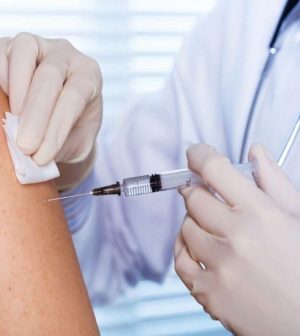- The Best Time of Day to Drink Bone Broth to Maximize Health Benefits
- 8 Ways to Increase Dopamine Naturally
- 7 Best Breads for Maintaining Stable Blood Sugar
- Gelatin vs. Collagen: Which is Best for Skin, Nails, and Joints?
- The Long-Term Effects of Daily Turmeric Supplements on Liver Health
- Could Your Grocery Store Meat Be Causing Recurring UTIs?
- Are You Making This Expensive Thermostat Error This Winter?
- Recognizing the Signs of Hypothyroidism
- 10 Strategies to Overcome Insomnia
- Could Artificial Sweeteners Be Aging the Brain Faster?
State Lotteries Don’t Boost COVID Vaccination Numbers: Study

Lotteries that pay cash and prizes to Americans who get vaccinated sound like a sure-fire recipe for success, but a new study finds they don’t actually boost vaccination rates.
After media reports suggested that Ohio’s “Vax-a-Million” lottery increased vaccination rates, other states decided to use lotteries to reinvigorate slowing vaccination rates.
“However, prior evaluations of the Ohio vaccine incentive lottery did not account for other changes in COVID-19 vaccination rates in the United States, such as those that may have been due to expansion of vaccination to ages 12 to 15,” said study corresponding author Dr. Allan Walkey, a professor of medicine at Boston University School of Medicine.
Using U.S. Centers for Disease Control and Prevention data on trends in vaccination rates among adults aged 18 and older, Walkey and colleagues compared vaccination rates before and after Ohio launched its lottery.
Other states that did not yet have vaccine lottery programs were used as a control group to enable the researchers to account for other factors — such as expanding vaccine eligibility to teens — that might influence vaccination rates.
“Our results suggest that state-based lotteries are of limited value in increasing vaccine uptake. Therefore, the resources devoted to vaccine lotteries may be more successfully invested in programs that target underlying reasons for vaccine hesitancy and low vaccine uptake,” Walkey said in a university news release.
The study was published online July 2 in the Journal of the American Medical Association.
It’s crucial to identify programs that are effective in increasing vaccination rates to combat the pandemic, the researchers noted.
“It is important to rigorously evaluate strategies designed to increase vaccine uptake, rapidly deploy successful strategies, and phase out those that do not work,” Walkey said.
The team said it hopes the findings will shift emphasis away from expensive and ineffective lotteries and to creating programs that actually work.
More information
The U.S. Centers for Disease Control and Prevention has more on COVID-19 vaccines.
SOURCE: Boston University School of Medicine, news release, July 2, 2021
Source: HealthDay
Copyright © 2026 HealthDay. All rights reserved.










